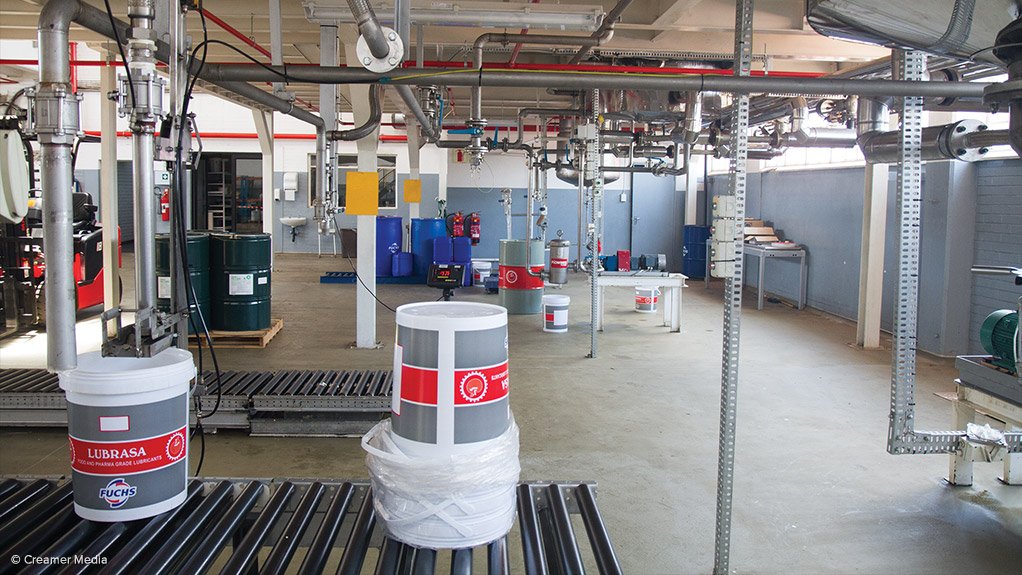Lubricants company creates specialist division to drive localisation


PLANT FOR PURPOSE Before food-grade lubrication can be manufactured, it needs certain certifications, including Kosher, Halaal and ISO 21469 certification
Photo by Duane Daws
Lubricants specialist FUCHS Lubricants South Africa (FUCHS) and its parent company FUCHS Petrolub, based in Germany, have created a Lubritech division to drive a specialisation and localisation agenda.
FUCHS MD Paul Deppe says the company has been buying Lubritech products from FUCHS Petrolub for some time, but having started operating last month in Isando, Gauteng, the Lubritech division within FUCHS allows for a focus on speciality lubricants and harmonises product ranges into one portfolio.
“The creation of the division shows our intent to further grow our mining and food lubricants business, as well as develop new markets for FUCHS Lubritech products, such as cement, wind, glass and sugar, with a skilled team of sales and product specialists ready to support customers.”
FUCHS Lubritech divisional manager Giles Cutter says the division pulls together a lot of functions that were already in place, but now has a formalised, coordinated structure. He mentions that the six-member- strong division has created three new job positions that FUCHS did not have before.
He says the team has specialised lubricants knowledge, therefore, no additional training was necessary; however, some crossover training will be required to transfer that knowledge to fields such as food or mining.
Cutter adds that the division also enables FUCHS to further solidify its footprint in South Africa by offering specialist lubricants not offered by the corporate fuel and lubricant manufacturers, such as Shell, which rather focuses on fuel and engine oil.
For example, wind turbine energy plants in the Cape region, glass product manufacturers in the Johannesburg and Cape regions, and sugar mills in KwaZulu-Natal and the wider Southern African region will need a specialist lubricant on demand to replace its traditionally used bitumen- based products, owing to it being banned in Europe and, therefore, likely to follow the same fate here locally.
FUCHS’ Lubritech division will focus on localising various ranges of specialist lubricants, including food-grade lubricant brand Cassida, which is a range of food-grade lubricants from Europe.
Additionally, FUCHS will also drive local manufacturing of specialised lubricants for open-gear equipment used in mining and mills for cement manufacturing plants. Cutter points out that it gives customers peace of mind when they do not have to wait for product imports, which often have a 12-week lead time.
“Long-lead times especially affect sectors, such as food production and mining, which have production plants that cannot simply be shut down until the lubricant for machinery arrives.”
Cutter highlights that the only challenge with specialist lubricants is the smaller market size, with wind turbine technology, for instance, still being new to South Africa.
Nonetheless, Cutter notes that the advantage of offering specialised lubricants is that it can extend equipment life, which is a big factor when customers are choosing a lubricant for machinery. For example, the mining industry uses machinery for crushing minerals that use gears costing millions of rands and, if a lubricant can extend that equipment’s life, there is a cost saving for the customer and a likely preference for FUCHS’ specialised products.
Cutter explains that, before a food-grade lubricant can be locally manufactured, it needs certain certifications that cost about R1-million to achieve, including Kosher, Halaal and ISO 21469 certification.
“It is not only about certifying that the lubricant is nontoxic, but also that it is sourced, manu- factured and stored in a way that is hygienic and considerate towards the environment.”
Further, he avers that open-gear lubricants need the approval of original-equipment manufacturers – including Metso, Autotech and FLSmidth – before local manufacture. These approvals are necessary when mines consider buying a particular lubricant.
FUCHS’ focus is on meeting these criteria before it starts manufacturing additional specialised lubricants locally. Cutter expects that the manufacturing of these products will start by the third quarter this year.
Article Enquiry
Email Article
Save Article
Feedback
To advertise email advertising@creamermedia.co.za or click here
Announcements
What's On
Subscribe to improve your user experience...
Option 1 (equivalent of R125 a month):
Receive a weekly copy of Creamer Media's Engineering News & Mining Weekly magazine
(print copy for those in South Africa and e-magazine for those outside of South Africa)
Receive daily email newsletters
Access to full search results
Access archive of magazine back copies
Access to Projects in Progress
Access to ONE Research Report of your choice in PDF format
Option 2 (equivalent of R375 a month):
All benefits from Option 1
PLUS
Access to Creamer Media's Research Channel Africa for ALL Research Reports, in PDF format, on various industrial and mining sectors
including Electricity; Water; Energy Transition; Hydrogen; Roads, Rail and Ports; Coal; Gold; Platinum; Battery Metals; etc.
Already a subscriber?
Forgotten your password?
Receive weekly copy of Creamer Media's Engineering News & Mining Weekly magazine (print copy for those in South Africa and e-magazine for those outside of South Africa)
➕
Recieve daily email newsletters
➕
Access to full search results
➕
Access archive of magazine back copies
➕
Access to Projects in Progress
➕
Access to ONE Research Report of your choice in PDF format
RESEARCH CHANNEL AFRICA
R4500 (equivalent of R375 a month)
SUBSCRIBEAll benefits from Option 1
➕
Access to Creamer Media's Research Channel Africa for ALL Research Reports on various industrial and mining sectors, in PDF format, including on:
Electricity
➕
Water
➕
Energy Transition
➕
Hydrogen
➕
Roads, Rail and Ports
➕
Coal
➕
Gold
➕
Platinum
➕
Battery Metals
➕
etc.
Receive all benefits from Option 1 or Option 2 delivered to numerous people at your company
➕
Multiple User names and Passwords for simultaneous log-ins
➕
Intranet integration access to all in your organisation



















